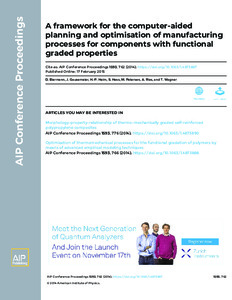| dc.date.accessioned | 2020-12-01T16:02:41Z | |
| dc.date.available | 2020-12-01T16:02:41Z | |
| dc.date.issued | 2015-02-17 | |
| dc.identifier | doi:10.17170/kobra-202011192224 | |
| dc.identifier.uri | http://hdl.handle.net/123456789/12062 | |
| dc.description | This article may be downloaded for personal use only. Any other use requires prior permission of the author and AIP Publishing. This article appeared in AIP Conference Proceedings 1593, 762 (2014) and may be found at https://doi.org/10.1063/1.4873887 | eng |
| dc.language.iso | eng | eng |
| dc.rights | Urheberrechtlich geschützt | |
| dc.rights.uri | https://rightsstatements.org/page/InC/1.0/ | |
| dc.subject | manufacturing process planning | eng |
| dc.subject | functionally graded components | eng |
| dc.subject | expert system | eng |
| dc.subject | specification technique | eng |
| dc.subject | sustainable production | eng |
| dc.subject.ddc | 600 | |
| dc.title | A framework for the computer-aided planning and optimisation of manufacturing processes for components with functional graded properties | eng |
| dc.type | Aufsatz | |
| dcterms.abstract | In this contribution a framework for the computer-aided planning and optimisation of functional graded components is presented. The framework is divided into three modules - the "Component Description", the "Expert System" for the synthetisation of several process chains and the "Modelling and Process Chain Optimisation". The Component Description module enhances a standard computer-aided design (CAD) model by a voxel-based representation of the graded properties. The Expert System synthesises process steps stored in the knowledge base to generate several alternative process chains. Each process chain is capable of producing components according to the enhanced CAD model and usually consists of a sequence of heating-, cooling-, and forming processes. The dependencies between the component and the applied manufacturing processes as well as between the processes themselves need to be considered. The Expert System utilises an ontology for that purpose. The ontology represents all dependencies in a structured way and connects the information of the knowledge base via relations. The third module performs the evaluation of the generated process chains. To accomplish this, the parameters of each process are optimised with respect to the component specification, whereby the result of the best parameterisation is used as representative value. Finally, the process chain which is capable of manufacturing a functionally graded component in an optimal way regarding to the property distributions of the component description is presented by means of a dedicated specification technique. | eng |
| dcterms.accessRights | open access | |
| dcterms.creator | Biermann, Dirk | |
| dcterms.creator | Gausemeier, Jürgen | |
| dcterms.creator | Heim, Hans-Peter | |
| dcterms.creator | Hess, Stefan | |
| dcterms.creator | Petersen, Marcus | |
| dcterms.creator | Ries, Angela | |
| dcterms.creator | Wagner, Tobias | |
| dc.relation.doi | doi:10.1063/1.4873887 | |
| dc.subject.swd | Funktioneller Gradientenwerkstoff | ger |
| dc.subject.swd | Expertensystem | ger |
| dc.subject.swd | Spezifikationstechnik | ger |
| dc.subject.swd | Produktion | ger |
| dc.subject.swd | Nachhaltigkeit | ger |
| dc.subject.swd | CAD | |
| dc.type.version | publishedVersion | |
| dcterms.source.identifier | EISSN 1551-7616 | |
| dcterms.source.issue | Issue 1 | |
| dcterms.source.journal | AIP Conference Proceedings | eng |
| dcterms.source.pageinfo | 762-765 | |
| dcterms.source.volume | Volume 1593 | |
| kup.iskup | false | |

